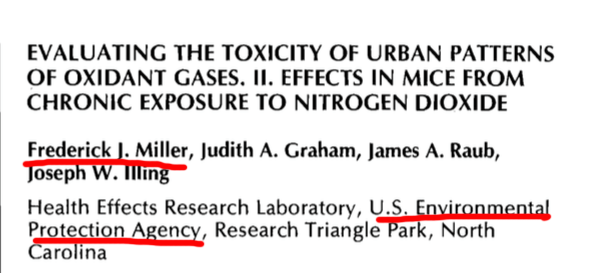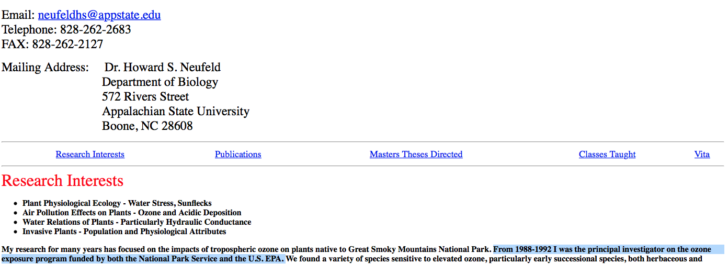What's going on?
For years, the Environmental Protection Agency has loaded its advisory panels with scientists who receive money, typically grants for research. The committees - Science Advisory Board and the Clean Air Scientific Committee - can even peer review their own research. One "independent" panel giving advice on the effects of airborne particulates had 17 out of 20 of its members receiving some form of compensation from the EPA. (See blow.)
As the new EPA Director, Scott Pruitt is cleaning house by replacing biased committee members. (Wall Street Journal, "A Step Toward Scientific Integrity at the EPA," July 18, 2017) in many cases, advisory members are from activist groups; scientists with opposing views are rejected.
Many people who supported the EPA's (questionable) agenda on environmental issues maintain this is a "war on science." This is a case of twisting language to avoid truth and casting a shadow on the opposition. The real war on science is a government department devoted to manipulating "science" to fit their agendas with predetermined outcomes created by compromised scientists.
Is the politicization of science another battlefield of the culture war? Who and what can we trust for unbiased information anymore? When is a fact just a theory, and why do we put so much of our faith in the imperfect, biased arena of science? It may be the best thing we have, but it is still best to "trust but verify" or better still, "be skeptical and verify."
junkscience.com
EPA stacked ozone science panel with $192 million worth of paid cronies
The best “science” money can buy.
The EPA’s most recent regulations for ground-level ozone are reputed to be the most expensive EPA regulations ever, costing trillions of dollars.
The EPA’s rules were endorsed by a panel of scientists required by law to review them — called the Clean Air Scientific Advisory Committee (CASAC). Both the Clean Air Act and the Federal Advisory Committee Act required that CASAC panels be independent and unbiased.
So was the panel independent and/or unbiased?
Below are listed the panel members at the amount of money they received in EPA grants, according to documents obtained from the EPA:
- Dr. H. Christopher Frey, North Carolina State University — $3,136,162
- Mr. George A. Allen, North east States for Coordinated Air Use Management — $3,907,111
- Mt., Ed Avol, University of Southern California — $67,163,221
- Dr. Michelle Bell, Yale University — $27,216,035
- Dr. Joseph Brain, Harvard university — $15,641,225
- Dr. David Chock, Independent Consultant — $0
- Dr. Ana Diez-Roux, Drexel University — $33,575,181
- Dr. David A Grantz, University of California, Riverside — $0
- Dr. Jack Harkema, Michigan State University — $26,918,114
- Dr. Daniel Jacob, Harvard University — $14,135,578
- Dr. Steven Kleeberger, National Institutes of Health — $22,456,958
- Dr. Frederick J. Miller, Independent Consultant — $0
- Dr. Howard Neufeld, Appalachain State University — $0
- Dr. Armistead (Ted) Russell, Georgia Institute of Technology — $22,310,139
- Dr. Helen Suh, Northeastern University — $16,680,251
- Dr. James Ultman, Pennsylvania State University — $18,750,000
- Dr. Sverre Vedal, University of Washington — $8,000,000
- Dr. Kathleen Weathers, Cary Institute — $0
- Dr. Peter Woodbury, Cornell University — $308,120
- Dr. Ron Wyzga, Electric Power Research Institute — $0
So of the 20 CASAC Ozone Panel members, 14 (70%) received grant money from the EPA.
The total amount of unique grants involved (some panel members shared grants) is $192,342,943, an average of $13,738,781.64 per grantee.
The EPA’s CASAC panels work on a consensus basis. So with 70% of panel members on the receiving end of $192 million in grants, a “consensus” supporting the EPA was not difficult to achieve.
UPDATE:
Though listed as an “independent consultant” by EPA, Frederick J. Miller is a former EPA staffer.
Though not listed as a “principal investigator” on any EPA grants, Kathleen Weathers’ employer, the Cary Institute for Ecosystem Studies,” has received $3,570,926 worth of grants from EPA.
Though not listed as a recent “principal investigator” on any EPA grants, Howard Neufeld was a “principal investigator” on an ozone-related grant from the EPA as follows:
So 17 of the 20 CASAC Ozone Panel members have current/former, direct/indirect EPA financial ties.




So, if the EPA said that cigarette smoke causes lung problems, would you then write an article telling people that cigarette smoke isn't harmful, because the epa is always wrong?
ReplyDelete-You've committed a false analogy.
-Ozone absolutely irritates asthma, with or without the EPA's science.
-Lying or $ spent is irrelevant to the facts.
-Theories change as new science is discovered. Thats why they're called theories.
-Facts today, might change tmrw. I hope you learn this before you allow a Dr. w/the science of yesterday, to treat your brain with an electrical zap -Afterall, Dr.'s today would deem that criminal. That "theory" has changed.
I agree with everything you say except that I have no knowledge of how ozone impacts asthma.
ReplyDeleteMy point was that the EPA has packed their advisory panels with scientists who have a self interest in serving the EPA's political goals because they want to continue to receive government funding. It is the same as when industries that create pollutants hire their own scientists to produc favorable outcomes. My point is, whoever pays the piper, calls the tune.